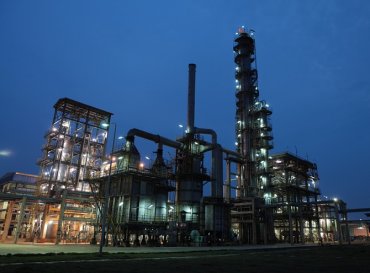China base oil refiner Hainan Handi Sunshine Petrochemical Co. is moving ahead with a delayed expansion of its API Group II plant, though the project has now been scaled back.
The second plant being built at the companys refinery on Hainan island is now designed with capacity to make 100,000 metric tons per year of Group II and III oils, a company representative told Lube Report Asia today. Previously the project had been pegged at 800,000 t/y. The representative, who spoke on condition of anonymity, said the expansion is under construction and should open by late 2017.

Photo: Hainan Handi Sunshine Petrochemical
Handi Sunshine Petrochemicals refinery in the Yangpu Economic Development Zone, on Hainan
Honeywell UOP and ExxonMobil announced last week that they had entered a joint agreement to license refining technology that makes fuels such as low-sulfur diesel and jet fuel along with Group II and III base stocks. UOP will provide its Unicracking technology, which converts higher-boiling hydrocarbons into lower-boiling fractions such as base oil, diesel and jet fuel.
ExxonMobil will contribute its MSDW catalytic de-waxing technology, which helps convert waxy molecules into highly refined base oil.
Handi Sunshine is not trying to shift its business toward fuels, though.
Fuel is a byproduct of UOPs hydrocracking technology, the representative said. Ideally we would like to sell it, but the fuel business is very difficult for a private refiner like us to get into. She noted that the fuels market is dominated by Chinas three big nationally owned refiners – Sinopec, CNPC and China National Offshore Oil Co.
Instead the company plans to remain focused on base oils, although it plans to market the new capacity for niche applications, such as food-grade lubricants, pharmaceuticals and cosmetics. The new plant will supply some solvent naphtha, too.
Located on Hainan, off the southern coast of Chinas mainland, Handi Sunshine was founded in 2006 and already has capacity to make 300,000 metric tons per year of Group II base stocks, along with white oils and transformer oils. Last year it launched a line of finished lubricants.
The company has not ruled out the possibility of expanding the second plant in the future, but for the moment has chosen to test the markets with a cautious, scaled-down project.